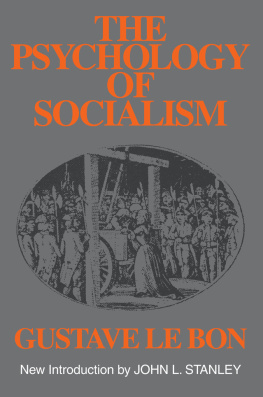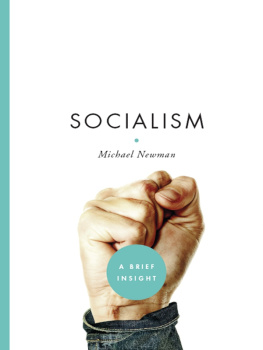Social Science Classics Series
Vilhelm Aubert, The Hidden Society
Samuel Bernstein, French Political and Intellectual History
Herbert Blumer, Critiques of Research in the Social Sciences
G.D.H. Cole, Guild Socialism Restated
Charles Horton Cooley, Human Nature and the Social Order
Charles Horton Cooley, Social Organization
Benedetto Croce, Historical Materialism and the Economics of Karl Marx
Henry de Man, The Psychology of Marxian Socialism
Albert Venn Dicey, Lectures on the Relation between Law and Public Opinion in England during the Nineteenth Century
Adam Ferguson, An Essay on the History of Civil Society
Ruth Fischer, Stalin and German Communism
G.S. Ghurye, The Scheduled Tribes of India
Ludwig Gumplowicz, Outlines of Sociology
Everett C. Hughes, The Sociological Eye
Helen MacGill Hughes, News and the Human Interest Story
Kurt Koffka, Growth of the Mind
Walter Laqueur, Young Germany
Harold J. Laski, The American Presidency
Gustave LeBon, The French Revolution and the Psychology of Revolution
Gustave LeBon, The Psychology of Socialism
Walter Lippmann, A Preface to Morals
Helen Merrel Lynd, England in the Eighteen- Eighties
Harriet Martineau, Society in America
Vilfredo Pareto, The Transformation of Democracy
Joseph A. Schumpeter, The Theory of Economic Development
George Bernard Shaw, The Intelligent Woman's Guide to Socialism and Capitalism
Werner Sombart, The fews and Modern Capitalism
Pitirim Sorokin, Social and Cultural Dynamics
Anselm Strauss et al., Psychiatric Ideologies
William Graham Sumner, Earth-Hunger and Other Essays
Thorstein Veblen, The Engineers and the Price System
Thorstein Veblen, The Theory of Business Enterprise
Graham Wallas, Human Nature in Politics
Max Weber, General Economic History
Florian Znaniecki, Cultural Sciences


INTRODUCTION TO THE TRANSACTION EDITION
Peter J. Steinberger
In introducing a book such as de Man's The Psychology of Marxian Socialism, my preference would be to consider the text on its own merits apart from the historical and biographical contexts in which it was written. Such a preference is rather out of fashion with political theorists these days. In particular, the so-called New Historians of political thought have argued forcefully that a critical appreciation of primary sources must be based upon an analysis of an author's intentions as shaped by linguistic, political, and social contexts. They claim that to reconstruct an argument in terms of timeless or transcendent categories is to deny the historical specificity characteristic of any piece of writing. My own judgment is that the New Historians tend to reduce texts to ideological artifacts and thereby fail to take seriously the implicit claim of the philosopher to be producing works that rise above the peculiarities of his own psyche and transcend the particularities of his age. It is quite certain that our understanding of, say, John Locke is aided by a knowledge of his activities and sentiments during the Glorious Revolution; but it seems equally clear that we only do justice to his thoughts if we also seek to determine whether his theory of democracy is correct or not.
Still, in the case of de Man it is difficult to ignore contextual factors. We cannot help to note, for example, that The Psychology of Marxian Socialism, an essay in socialist revisionism, was written in a decade famous for such essays. Georg Lukacs's History and Class Consciousness, Karl Korsch's Marxism and Philosophy, and Antonio Gramsci's Prison Notebooks all belong to the 1920s; only shortly thereafter began the major work of Max Horkheimer and the others associated with the Frankfurt School. Although de Man specifically renounces Marxism, he continues to call himself a socialist, and thus his writings invite comparison with those of the others.
Then too, there are the singular and disturbing facts of de Man's biography. Indeed, his life may be thought of as a reflection of the most important currents of European culture and politics in the first half of this century. An active and committed Marxist in his early years, he eventually became a major figure among Europe's democratic or parliamentary socialists. He fought in World War I and was decorated with the Belgian Croix de Guerre. He had an academic career and taught at the University of Frankfurt, where his colleagues included Karl Mannheim and Max Horkheimer. A prolific writer, he authored the influential Plan du Travail for the recovery of the Belgian economy. In the 1930s he became leader of the Parti Ouvrier Beige (POB) and briefly served in the government as a minister. As World War II approached, this major socialist figure and one-time Marxist became friend and confidant to Belgium's King Leopold III.
The astonishing culmination of de Man's life was the publication of his "Manifesto to the Members of the POB" in 1940, in which he urged a policy of appeasement and amity toward the Nazi invaders. The "Manifesto" celebrated the collapse of bourgeois liberalism under Hitler's armies, praised the Nazi regime as one which "has lessened class differences much more efficaciously than the self-styled democrats," and looked hopefully toward a future of community and prosperity guided by an authoritarian kind of socialism. It would be absurd to call de Man a Nazi, but it would be equally wrong to dismiss this episode as something merely accidental and inessential. The denouement of de Man's life involved his conviction in absentia of treason against the Belgian state. He spent his last years in bitter exile in Switzerland.
We may well be tempted to view The Psychology of Marxian Socialism in the light of these facts. It would be particularly interesting to read this book as a precursor of the 1940 "Manifesto," and to find in it the seeds of a fascist temperament. Indeed, there are materials here for just such a study. But to pursue this tack would be to ignore what is truly of interest and importance in this book, namely, de Man's particular account of socialism and of the role of social theory.
Above I have called The Psychology of Marxian Socialism an essay in socialist revisionism. This is a phrase that de Man explicitly rejected, eager as he was to distance himself from the work of revisionists such as Edward Bernstein. Yet, in this book de Man clearly pleads for a new and more relevant socialism, purged of its doctrinaire and unrealistic elements and aimed at providing a free and peaceful kind of social existence. He is therefore most certainly engaged in revising socialism, and it is in these terms that we can most fruitfully approach his work.
The Critique Of Marxism
The revision of socialism here proposed is essentially directed at the ideas of Marx as adopted and articulated by de Man's contemporaries. De Man's critique of Marxism is not merely one of many aspects of his argument; in large part, the book is nothing more than an attack on orthodox Marxist doctrine. De Man makes no bones about this. He not only repudiates his own former views, but defines his task precisely as the "liquidation" of Marxism (p. 411). In a sense, his criticisms will be familiar to those with a knowledge of the leftist controversies of the post-World War I period. For de Man, Marxism is fundamentally a scientistic enterprise, rooted in nineteenth-century positivism and espousing a kind of deterministic, mechanistic, and hedonistic view of the world (p. 23). Marxism reduces man "to the level of a mere object among the objects of his environment, and these external historical 'relationships' arei held to determine his volitions and to decide his objectives." As such, Marxism operates in terms of "the laws of social evolution, which are assumed to have the inexorable necessity of the 'laws of nature' formulated in physical science." The result is a philosophy every bit as dehumanizing as capitalist philosophy, one which, for example, criticizes certain elements of Taylorism while actually embracing Taylorism's view of the "ideal workman" (p. 69).













